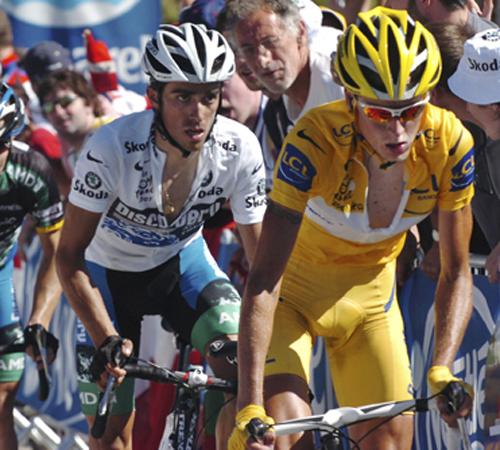Tour leader Rasmussen taken out of Tour de France by Rabobank team

Overall leader Michael Rasmussen of Denmark, right, is followed by Alberto Contador of Spain and Levi Leipheimer of the U.S., left, as they climb the Aubisque pass during the 16th stage of the Tour de France cycling race between Orthez and Aubisque pass, Bernard Papon, The Associated Press
Jul 26, 2007
GOURETTE, France – One of its biggest stars is already gone, and now so is the leader of the Tour de France.
Michael Rasmussen was removed from the race by his Rabobank team after winning Wednesday’s stage, a day after Alexandre Vinokourov and his team withdrew when the star cyclist tested positive for a banned blood transfusion.
“Michael Rasmussen has been sent home for violating (the team’s) internal rules,” Rabobank spokesman Jacob Bergsma told The Associated Press by phone.
The expulsion, which Bergsma said was ordered by the Dutch team’s sponsor, was linked to “incorrect” information that Rasmussen gave to the team’s sports director over his whereabouts last month. The Danish cyclist missed random drug tests May 8 and June 28, saying he was in Mexico. But a former rider, Davide Cassani, told Denmark’s Danmarks Radio on Wednesday that he had seen Rasmussen in Italy in mid-June.
Only once before in the history of the 104-year-old Tour has the race leader been expelled. In 1978, Belgian rider Michel Pollentier, trying to evade doping controls after winning a stage at the Alpe d’Huez in the Alps, was caught with an intricate tube-and-container system that contained urine that was not his, said Tour historian Jean-Paul Brouchon.
Get The Daily Illini in your inbox!
Rasmussen, who has led since July 15 and looked set to win the race which ends on Sunday in Paris, could not be reached for comment late Wednesday.
But just hours before he was kicked out of the Tour, the 33-year-old told the AP he was being victimized.
“Of course I’m clean,” Rasmussen said, after a doping test following Wednesday’s stage win. “Like I said, I’ve been tested 17 times now in less than two weeks. Both the peloton and the public, they’re just taking their frustration out on me now. I mean, all I can say is that by now I had my test number 17 on this Tour, and all of those have come back negative. I don’t feel I can do anymore than that.”
Although Rasmussen has not tested positive, some fellow cyclists had openly voiced their skepticism about him.
Fans booed Rasmussen at the start of Wednesday’s stage, and mostly French teams staged a protest to express disgust at the doping scandals that have left cycling’s credibility in tatters. As the starter’s flag came down, dozens of protesting riders stood still as Rasmussen, ace sprinter Tom Boonen and several others began riding away.
Some riders were forced to lift up their bicycles to get around their protesting colleagues, who eventually rejoined the race after causing a 13-minute delay. But the message was sent.
“We’re fed up,” AG2R rider Ludovic Turpin of France told Eurosport television.
Tour organizers said Tuesday they would have stopped Rasmussen from taking part in the race had they known about the missed tests before the July 7 start.
“We cannot say that Rasmussen cheated, but his flippancy and his lies on his whereabouts had become unbearable,” Tour director Christian Prudhomme said.
The leader of cycling’s governing body applauded the decision.
“My immediate reaction is, why didn’t they do this at the end of June, when they had the same information?” International Cycling Union president Pat McQuaid said. “The team decided to pull him out _ that’s their prerogative. I can only applaud that. It’s a zero-tolerance policy, and it’s a lesson for the future.”
With Rasmussen out, Spanish rider Alberto Contador of the Discovery Channel team moved into the lead. Australian Cadel Evans, who rides for Predictor-Lotto, moved up to second, with U.S. rider Levi Leipheimer, also with Discovery, now third.
“It’s in no way a celebration on our end. It’s the third piece of bad news,” Discovery Channel spokesman P.J. Rabice said. “It reflects badly on our sport.”
Bergsma said the Rabobank team, which has suspended Rasmussen, had not decided yet whether its other riders would take the start Thursday in Pau. Its next best rider was Michael Boogerd of the Netherlands, 16th and about 28 minutes behind Contador.
After the Tour’s upbeat start in London, when millions of spectators lined streets to watch, bad news – nearly all of it related to doping – quickly dominated.
German rider Patrick Sinkewitz crashed into a spectator then was revealed to have failed a drug test in training before the Tour, and Vinokourov was sent home after testing positive for a banned blood transfusion. On Wednesday, as Rasmussen was riding toward his stage 16 win, the Cofidis squad confirmed its Italian rider Cristian Moreni failed a doping test, prompting the withdrawal of the entire squad.
Police detained Moreni after he finished the stage and searched the hotel where his Cofidis team was staying. Results from the raid weren’t expected until Thursday. France has tough laws against trafficking in doping products.
Cofidis manager Eric Boyer said Moreni “accepted his wrongdoing” and waived his right for a follow-up test to confirm the results of the first, which was positive for the male hormone testosterone.
All this talk of doping prompted Jean-Francois Lamour, vice president of the World Anti-Doping Agency, to suggest the sport should be yanked from the Olympics. German public broadcasters have stopped airing the race, and one of Switzerland’s biggest newspapers stopped writing about it. The daily Tages Anzeiger said on its Web site Wednesday it will limit its coverage to results and doping stories.
Tom Lund, chairman of the Danish Cycling Union, said Rabobank “did they right thing, because it is a situation that no serious team cannot live with.”
“It is an unfortunate situation for Danish cycling, for international cycling.”





